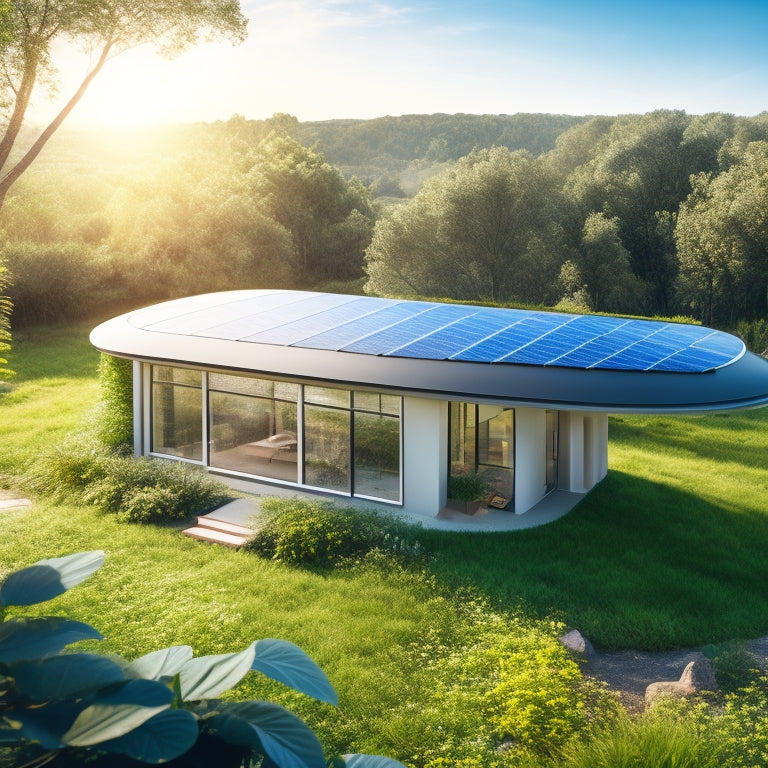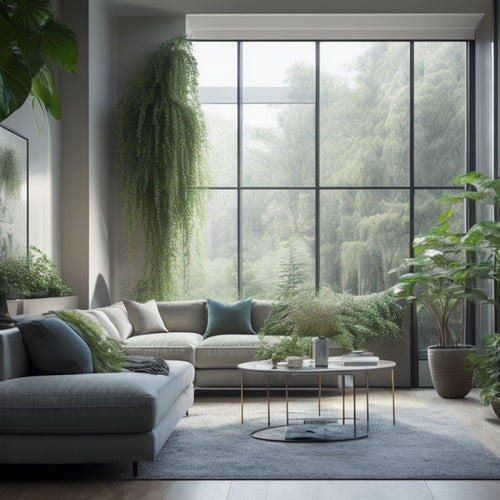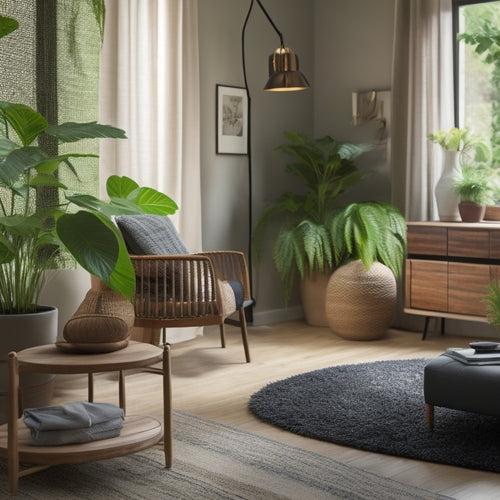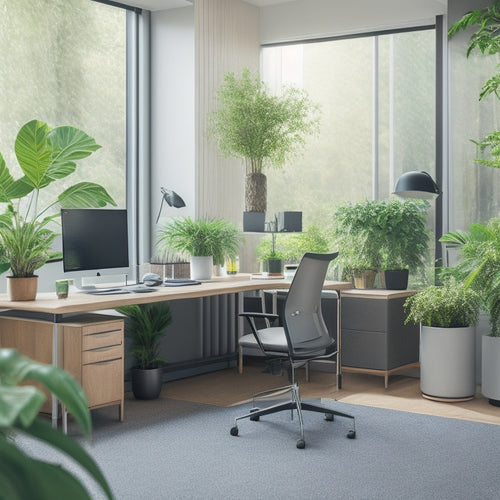
What Green HVAC Innovations Transform Modern Homes?
Share
You're stepping into a modern home that's not only comfortable but also environmentally conscious, thanks to state-of-the-art green HVAC innovations that change the way you live. Smart HVAC systems with rooftop solar panels and zoning capabilities optimize energy efficiency, while energy-efficient cooling solutions like solar powered chillers and geothermal cooling reduce your carbon footprint. Sustainable air filtration systems and green ventilation technologies improve indoor air quality, and eco-friendly heating innovations like biomass heating and radiant floor heating minimize fossil fuel dependence. As you investigate these innovations, you'll find a greener, healthier, and more sustainable living space awaiting you.
Key Takeaways
- Smart HVAC system designs integrate thermostats and zoning for optimal energy efficiency and a comfortable indoor environment.
- Solar-powered chillers and geothermal cooling reduce carbon footprints and energy consumption, supporting climate action initiatives.
- Sustainable air filtration systems with biodegradable filters improve indoor air quality while minimizing waste and environmental impact.
- Green ventilation technologies, including hybrid electric solutions and passive ventilation strategies, enhance indoor air quality while reducing carbon footprints.
- Eco-friendly heating innovations, such as biomass heating and radiant floor heating, decrease fossil fuel dependence and provide cost-effective comfort.
Smart HVAC System Designs
Designing smart HVAC systems requires integrating various components to optimize energy efficiency and indoor air quality.
You'll need to combine smart thermostats, zoning systems, and other advanced technologies to create a seamless and efficient system. Additionally, incorporating rooftop solar panels solar powered EV charging can reduce reliance on grid electricity and energy bills.
Smart thermostats, for instance, can learn your schedule and preferences to adjust the temperature accordingly, while zoning systems allow you to control different areas of your home independently.
By integrating these components, you can create a system that not only saves energy but also provides a comfortable and healthy indoor environment.
With a smart HVAC system, you'll have greater control over your home's climate, and you'll be able to enjoy the freedom to live life on your own terms.
Energy-Efficient Cooling Solutions
You can greatly reduce your energy consumption by opting for energy-efficient cooling solutions.
One innovative approach is to utilize the power of solar energy with solar powered chillers, which not only reduce carbon footprints renewable energy sources but also support climate action initiatives. These systems use photovoltaic panels to generate electricity, which is then used to power a chiller that cools your home.
Another option is geothermal cooling, which employs the natural temperature of the earth to cool your home. By tapping into the earth's consistent temperature, geothermal systems can provide efficient and consistent cooling.
Both of these solutions offer a significant reduction in energy consumption, making them an attractive option for those seeking freedom from high energy bills.
Sustainable Air Filtration Systems
As homeowners prioritize energy-efficient cooling solutions, they're also recognizing the importance of indoor air quality.
You're likely wondering how to achieve better air quality while staying eco-friendly. Sustainable air filtration systems are the answer. These innovative systems employ biodegradable filters that reduce waste and minimize environmental impact, much like solar-powered charging solutions that reduce carbon footprint.
By integrating these filters into your HVAC system, you'll not only improve indoor air quality but also contribute to a greener future, much like the role of energy storage systems in enhancing grid resiliency.
By investing in sustainable air filtration, you're not only improving your home's air quality but also contributing to a greener future.
Furthermore, sustainable air filtration systems are designed to capture 99% of airborne particles, including dust, pollen, and other pollutants. This means cleaner air and a healthier living space.
Green Ventilation Technologies Today
While sustainable air filtration systems tackle indoor air quality, green ventilation technologies play an essential role in facilitating a healthy exchange of air between indoors and outdoors.
You'll find that modern homes incorporate green ventilation technologies to reduce energy consumption and improve indoor air quality. By leveraging hybrid electric solutions electric vehicle charging stations and renewable energy solutions, homeowners can reduce their carbon footprint and reliance on fossil fuels.
Passive ventilation strategies, such as operable windows and clerestory windows, allow you to control natural airflow, reducing the need for mechanical ventilation systems. This approach not only saves energy but also promotes a healthier living environment.
Eco-Friendly Heating Innovations
Modern heating systems are undergoing a significant change, driven by the need to reduce carbon emissions and mitigate climate change.
You're likely to benefit from eco-friendly heating innovations that prioritize sustainability and efficiency. As we shift towards carbon neutral transportation systems, biomass heating, for instance, makes use of organic matter like wood chips or agricultural waste to generate heat, reducing dependence on fossil fuels.
Radiant floor heating is another innovation that warms your home by circulating warm water through pipes under the floor, providing consistent, energy-efficient heat.
These state-of-the-art solutions not only minimize your carbon footprint but also offer cost-effective, comfortable, and healthy indoor environments.
Frequently Asked Questions
How Do Green HVAC Systems Impact Property Resale Value?
You'll enhance your property's resale value by installing a green HVAC system, which showcases energy savings and increases property appeal, attracting eco-conscious buyers and improving your home's marketability, ultimately leading to a higher selling price.
Can DIY HVAC Maintenance Void Manufacturer Warranties?
When you take DIY HVAC maintenance into your own hands, you risk voiding the manufacturer's warranty, but following precise guidelines can mitigate warranty implications - know the rules to maintain your freedom and your system's integrity.
Are There Government Incentives for Green HVAC Upgrades?
You can capitalize on government incentives for green HVAC upgrades, such as federal tax credits and state rebates, by investing in energy-efficient systems, conducting energy audits, and exploring financing options that promote eco-friendly living.
Do Energy-Efficient HVAC Systems Require More Frequent Replacements?
You'll find that energy-efficient HVAC systems often have a similar lifespan to traditional ones, but their replacement costs can be higher due to advanced technology; however, you'll save money on energy bills, and that's a trade-off you'll appreciate.
Can Green HVAC Systems Improve Indoor Air Quality for Asthma Sufferers?
As you breathe freely, imagine a shield of protection enveloping your home, where green HVAC systems wield air filtration and humidity control like mighty swords, vanquishing pollutants and allergens, bringing solace to asthma sufferers like a gentle breeze on a summer day.
Related Posts
-

Why Vertical Gardens Reduce Home Energy Consumption
By incorporating a vertical garden into your home design, you'll reduce energy consumption through natural insulation...
-

10 Eco-Friendly Air Management Tools for Clean Home Living
You're taking an essential step towards creating a healthier living space by seeking eco-friendly air management tool...
-

What Air Purifiers Save Energy in Work Areas?
You can cut energy costs and reduce your carbon footprint by choosing air purifiers designed with energy efficiency i...


